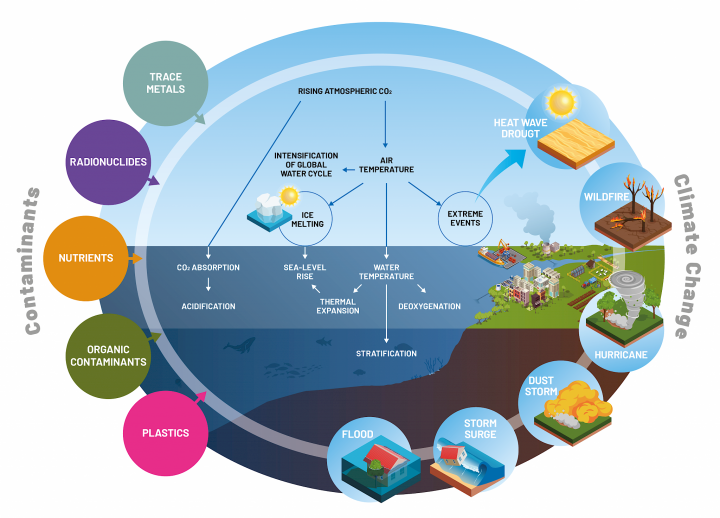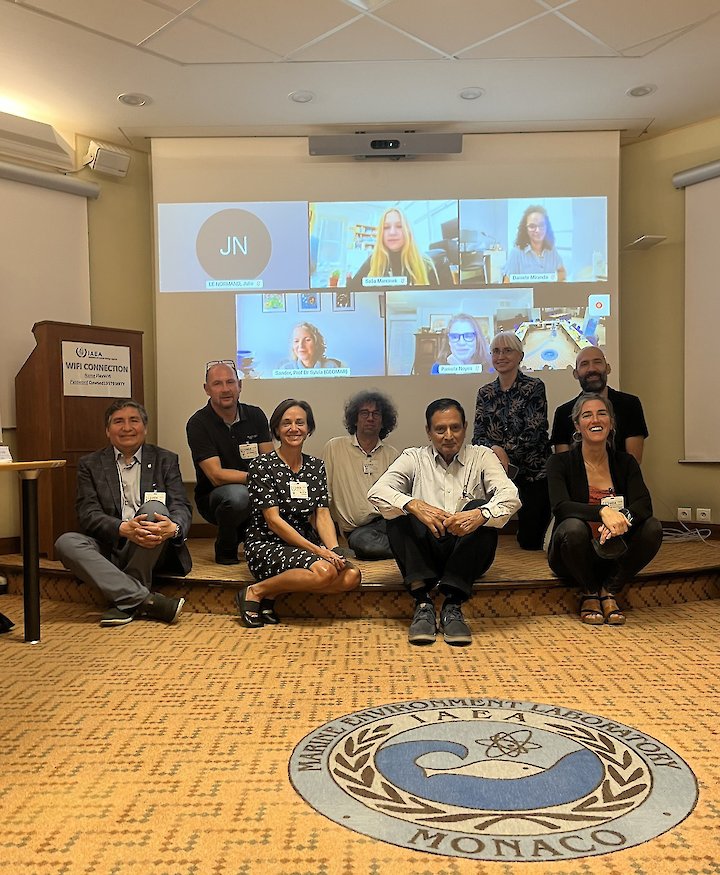Sponsoring Agencies : International Atomic Energy Agency, United Nations Environment Programme, IOC-UNESCO, World Meteorological Organization, International Maritime Organization
Global climate change is increasingly recognized as a potential phenomenon that can impact ecosystem services, functions, and human wellbeing for decades to come. The climate change stressors (e.g. temperature, pH, oxygen) impact the biotic and abiotic compartments and socio-economic components of the Earth system. Recent studies have shown that changes in stressor conditions (ocean acidification, ocean deoxygenation, and ocean warming) not only present isolated threats but are also part of a network of interdependent components of the Earth Systems. A rapid increase in the temperature could lead to cascading impacts such as sea-level rise, coastal erosion, intensification of hydrological cycles, and extreme events (cyclones, heat waves, forest fires) that may impact the environmental fate, transport, and cycling of pollutants. These events may alter redox conditions of the ocean, sediments, and soils, sediment stability, and introduce salinity, among other changes, promoting the remobilization of elements (e.g., As and Hg), from both geogenic and anthropogenic sources, stored in natural reservoirs in the tropics (e.g. mangrove soils) and in high latitudes (e.g., Arctic permafrost). Bioavailability, bioaccumulation, and toxicity of pollutants (e.g., nutrients, metals, organic compounds, plastics, and radionuclides) may also be exacerbated under global change conditions negatively affecting coastal and ocean ecosystem services and compromising ocean sustainability and food security. Consequently, climate change impacts can be a major threat not only to the environment but also to political and socio-economic stability and human health.
Adapted from Hatje eta. 2022 DOI: 103389/fmars.2022.936109
The understanding of the interactions between climate change, pollutants, and environmental risks is still largely unknown. The IPCC and national reports explicitly recognize the interaction between land-use change, economic activities, water resources development, and impacts on ecosystems. However, we still don’t have a mechanistic understanding of how pollutants and stressors interact to allow general predictions to be made. Because most overlapping stressors yield synergies that enhance the effect of single stressors, pollutants will be affected in complex and distinct ways and some pollutants may be more strongly affected than others.
It is time to systematically review existing literature on the climate change impacts on pollutants in the ocean and coastal systems and identify scientific gaps on the fate and dynamics of pollutants under global changes to roadmap future research and new challenges. These data are also crucial for the performance of human health and ecological risk assessments and the modeling of predictive scenarios.
The WG 45 combines the efforts of a multidisciplinary group of experts to better understand the interactions of pollutants and climate change stressors to inform stockholders and decision-makers to better act towards the expected outcomes of the UN Decade of Ocean Science for Sustainable Development (a clean, healthy, productive, resilient, and predictable ocean) in consonance with the Sustainable Development Goals (SGD 14 - Life below water; SGD 2 - Zero hunger; SGD 6 Clean water and sanitation; SGD 13 - Climate action) of the 2030 agenda. The objectives of this WG are:
- to critically review existing research on the effects of climate change (ocean physics and chemistry) on the speciation, toxicity, bioaccumulation, mobilization, and transport of pollutants in the ocean and coastal ecosystems identifying knowledge gaps;
- to document the central role and global importance of climate change on the coastal and marine ecosystems' functions and services.
- to make recommendations for future research directions on the effect of climate changes in the speciation, cycling, toxicity, transport, mobility, and bioavailability of diverse pollutants, including trace elements, radionuclides, organic pollutants, and nutrients.
Activities
The first meeting of the working group, which was held virtually in July 2021, deliberated on the working plan and initial priority topics to be systematically reviewed to assess the state of the art, knowledge gaps, and potential impacts of climate change on the fate, toxicity, speciation, and bioaccumulation of contaminants in the ocean. This information will roadmap the future work needed (e.g., a perspective manuscript, systematic reviews, manipulative and field experiments, and modeling). The discussions also covered:
- Impacts of the open ocean and coastal systems warming, acidification, and deoxygenation affecting pollutants speciation, bioavailability, bioaccumulation, toxicity, and transport;
- Effects of extreme events and sea-level rise on the remobilization and transport of pollutants.
The group highlighted the need to consider a holistic approach by integrating natural and social sciences, and the requirement additional members to provide expertise on potential socio-economic impacts assessments.
Current WG 45 Members
Vanessa Hatje (Chair), Manmohan Sarin (Co-chair), Elisabeth Holland, Alessandro Tagliabue, Christoph Voelker, Dario Omanovic, Núria Casacuberta Arola, Ricardo O. Barra, Sylvia Sander, Pamela Noyes and Justin Gwynn.

